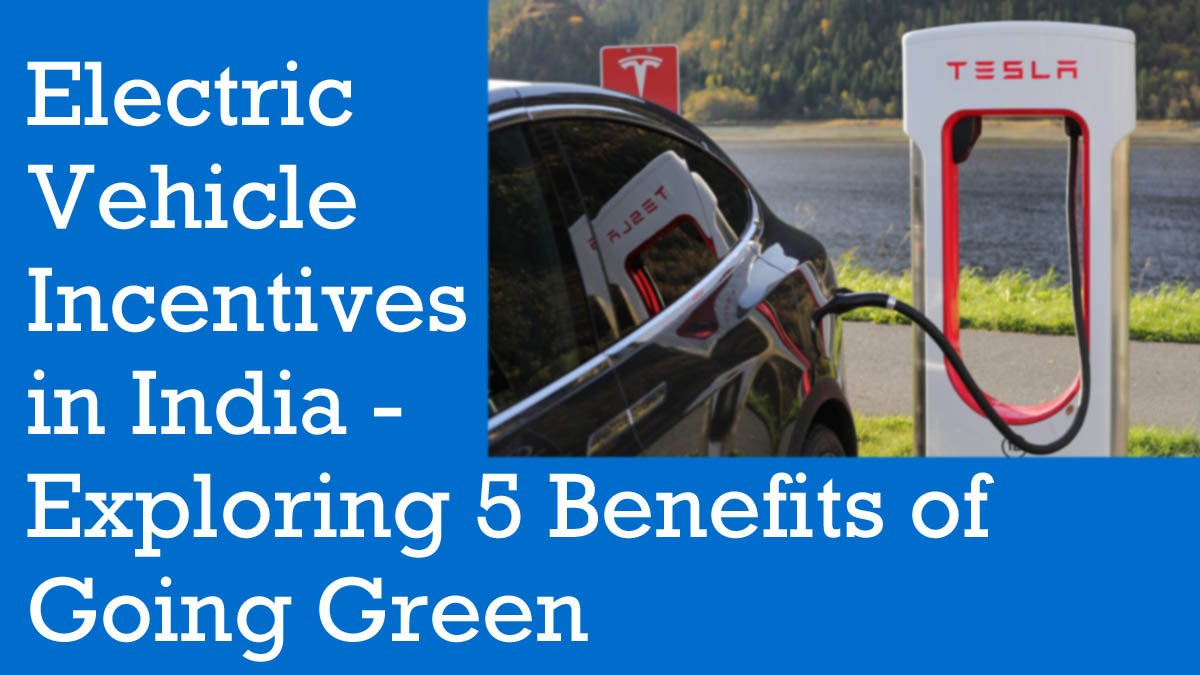Electric Vehicle Incentives in India: Exploring 5 Benefits of Going Green

The upfront expense of an electric vehicle makes it seem more expensive than a gas-powered one. Electric vehicles’ lifetime cost is lower. Electric automobiles are cheaper thanks to government incentives in India which are termed Electric Vehicle Incentives.
Introduction
Electric vehicles (EVs) are gaining popularity in India as a means of reducing pollution and saving money on fuel. The Indian government has created a number of incentives and initiatives to encourage more people to switch to electric vehicles. This article will examine the numerous incentives offered to electric vehicle owners in India and the advantages of purchasing an electric vehicle.
What are Electric Vehicle Incentives?
Electric Vehicle Incentives are monetary or non-monetary incentives issued by the government to encourage the purchase of electric vehicles. This comprises tax credits, grants, and subsidies.
Tax Credits
The government of India gives tax incentives for electric automobiles. Both the purchase of a new electric car and the installation of charging infrastructure are eligible for this incentive. The tax credits are determined by the battery capacity and other criteria.
Subsidies
Government subsidies are also available to encourage the purchase of electric automobiles. The acquisition of new electric vehicles and the construction of charging infrastructure are subsidised.
Grants
Government grants are also available to encourage individuals to switch to electric automobiles. Research and development of electric vehicle technology, as well as the acquisition of electric vehicles, are eligible for grants.
Other Incentives
Additionally, the government offers incentives to encourage individuals to switch to electric vehicles. This includes power bill reductions, free parking, and free charging.
Benefits of Investing in an Electric Vehicle
There are numerous advantages to purchasing an electric vehicle. Electric vehicles are more efficient than conventional vehicles because they consume less energy and emit fewer pollutants. They are also less expensive to operate and maintain. Additionally, electric vehicles are more pleasant and quieter to ride in.
Electric Vehicle Incentive Schemes
There are two types of electric vehicle incentive schemes which are mentioned below –
- National Incentive Scheme
- State Incentive Scheme
National Incentive Scheme
FAME, which stands for Faster Adoption and Manufacturing of (Hybrid and) Electric vehicles, is India’s most important programme to promote electric mobility right now. FAME-II is now in its second phase of implementation. It will be in place for three years starting on April 1, 2019, with a budget of 10,000 Cr. These are the benefits of the scheme –
| Total Approximate Incentives | Approximate Size of Battery |
|---|---|
| Two-wheelers – Rs 15000/- per kWh upto 40% of the cost of Vehicles | Two-wheelers – 2 kWh |
| Three-wheelers – Rs 10000/- per kWh | Three-wheelers – 5 kWh |
| Four-wheelers – Rs 10000/- per kWh | Four-wheelers – 15 kWh |
| E-Buses – Rs 20000/- per kWh | E-Buses – 250 kWh |
| E-Trucks – Rs 20000/- per kWh |
State Incentive Scheme
Every state has some kind of incentive for you to buy an electric car. Click on the link to learn more about policies at the state level here.
Conclusion
Electric vehicles are gaining popularity in India as a means of reducing pollution and saving money on petrol. The Indian government has created a number of incentives and initiatives to encourage more people to switch to electric vehicles which you now already know as Electric Vehicle Incentives. This article examined the numerous incentives offered to electric vehicle owners in India and the advantages of investing in an electric vehicle. You can learn more at Niti Ayog e-Amrit. Some of the key mechanisms for getting electric vehicle incentives are –
- Purchase Incentives – The user gets a direct discount on the price of the electric car.
- Coupons – A financial reward where the money is paid back later.
- Interest Subventions – A discount is given on the interest rate when a loan is taken out.
- Road tax exemption – The road tax is not charged when the car is bought.
- Registration fee exemption – The one-time registration fee that comes with buying a new car is no longer needed.
- Income tax benefit – Given as a reduction to the amount of taxes a person has to pay to the government.
- Scrapping incentives – Provided when old gasoline and diesel vehicles are taken off the road.
- Others – People can also take advantage of electric vehicle incentives like interest-free loans, top-up subsidies, special incentives for electric three-wheelers, etc.



